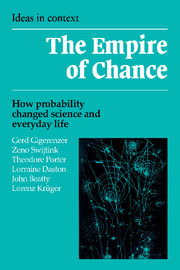Book contents
- Frontmatter
- Dedication
- Contents
- Acknowledgments
- Introduction
- 1 Classical probabilities, 1660–1840
- 2 Statistical probabilities, 1820–1900
- 3 The inference experts
- 4 Chance and life: controversies in modern biology
- 5 The probabilistic revolution in physics
- 6 Statistics of the mind
- 7 Numbers rule the world
- 8 The implications of chance
- References
- Name index
- Subject index
4 - Chance and life: controversies in modern biology
Published online by Cambridge University Press: 05 December 2013
- Frontmatter
- Dedication
- Contents
- Acknowledgments
- Introduction
- 1 Classical probabilities, 1660–1840
- 2 Statistical probabilities, 1820–1900
- 3 The inference experts
- 4 Chance and life: controversies in modern biology
- 5 The probabilistic revolution in physics
- 6 Statistics of the mind
- 7 Numbers rule the world
- 8 The implications of chance
- References
- Name index
- Subject index
Summary
What does chance ever do for us?
William Paley (1802)INTRODUCTION
Developments in probability theory and statistics have certainly had a great impact on biology. But the rise and role of probabilistic and statistical thinking in biology is no mere reflection of those developments. In the first place, as was discussed in chapter 2, biology itself has had a significant influence on statistical thought. In the second place, there are episodes having to do with the rise and role of probabilistic thinking in biology that are neither greatly illuminated by, nor shed much light on, the development of what we have come to call “probability theory” and “statistics” proper. These latter developments mainly have to do with problems internal to biology.
In continuing the discussion begun in previous chapters about attitudes of biologists toward chance, let us now shift our perspective and look at the topic from the point of view of biologists qua biologists with their specifically biological concerns in mind. A number of the episodes to be discussed involve the most recalcitrant biological controversies of modern times: controversies concerning vitalism, mechanism, teleology, essentialism, and levels of organization and explanation. The special senses of “chance” invoked in each of these controversies, and the various motivations for or against taking chance seriously in each case are bound up with the terms of the dispute in question.
- Type
- Chapter
- Information
- The Empire of ChanceHow Probability Changed Science and Everyday Life, pp. 123 - 162Publisher: Cambridge University PressPrint publication year: 1989



